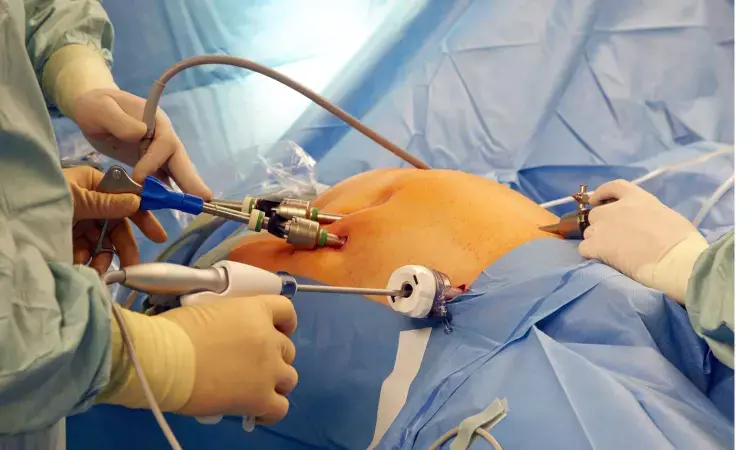- Home
- Medical news & Guidelines
- Anesthesiology
- Cardiology and CTVS
- Critical Care
- Dentistry
- Dermatology
- Diabetes and Endocrinology
- ENT
- Gastroenterology
- Medicine
- Nephrology
- Neurology
- Obstretics-Gynaecology
- Oncology
- Ophthalmology
- Orthopaedics
- Pediatrics-Neonatology
- Psychiatry
- Pulmonology
- Radiology
- Surgery
- Urology
- Laboratory Medicine
- Diet
- Nursing
- Paramedical
- Physiotherapy
- Health news
- Fact Check
- Bone Health Fact Check
- Brain Health Fact Check
- Cancer Related Fact Check
- Child Care Fact Check
- Dental and oral health fact check
- Diabetes and metabolic health fact check
- Diet and Nutrition Fact Check
- Eye and ENT Care Fact Check
- Fitness fact check
- Gut health fact check
- Heart health fact check
- Kidney health fact check
- Medical education fact check
- Men's health fact check
- Respiratory fact check
- Skin and hair care fact check
- Vaccine and Immunization fact check
- Women's health fact check
- AYUSH
- State News
- Andaman and Nicobar Islands
- Andhra Pradesh
- Arunachal Pradesh
- Assam
- Bihar
- Chandigarh
- Chattisgarh
- Dadra and Nagar Haveli
- Daman and Diu
- Delhi
- Goa
- Gujarat
- Haryana
- Himachal Pradesh
- Jammu & Kashmir
- Jharkhand
- Karnataka
- Kerala
- Ladakh
- Lakshadweep
- Madhya Pradesh
- Maharashtra
- Manipur
- Meghalaya
- Mizoram
- Nagaland
- Odisha
- Puducherry
- Punjab
- Rajasthan
- Sikkim
- Tamil Nadu
- Telangana
- Tripura
- Uttar Pradesh
- Uttrakhand
- West Bengal
- Medical Education
- Industry
Substantial Weight Loss following Bariatric Surgery may improve Lung Function

Rockville: Bariatric surgery, a surgical procedure to alter the digestive system or reduce stomach size, triggers ''substantial weight loss and improves lung function,'' according to researchers from the University of Vermont.
Researchers also found post-surgery plasma collected from volunteers showed a reduced inflammatory response from cells that line the airways compared to pre-surgery plasma. The findings are published in the American Journal of Physiology-Lung Cellular and Molecular Physiology. It has been chosen as an APSselect article for January.
The findings of this study align with previous literature, which also show the benefits of bariatric surgery such as weight loss and improved lung function. For this study, researchers were focused on understanding the mechanisms behind these improvements in hopes of developing new treatments for obese asthma. In addition, methods possibly mimicking the benefits of weight loss, including exercise and diet changes, may also lead to new therapeutics.
The research team set out to learn how obesity and weight loss affect the airway as it relates to asthma. The investigation method consisted of using cells that line the airways and control airway narrowing. Researchers used the results to examine the effects of circulating fat-derived factors from asthmatic and non-asthmatic obese patients undergoing bariatric surgery. Scientists collected data on lung function, body mass index and self-reported asthma management. Fat tissue was collected during bariatric surgery. Plasma samples were collected before and at various stages after bariatric surgery.
“Our findings suggest that while weight loss is beneficial, fat-derived factors may not be the main contributors that affect obese asthma,” said Paola E. Peña García, BSc, a PhD candidate and lead author of the study. Researchers conceded that more studies are needed to fully understand how obesity and weight loss affect asthma treatment.
Read the full article, “Bariatric surgery decreases the capacity of plasma from obese asthmatic subjects to augment airway epithelial cell pro-inflammatory cytokine production.” It is highlighted as one of this month’s “best of the best” as part of the American Physiological Society’s APSselect program. Read all of this month’s selected research articles.
References: Stanislavs Vasiljevs, Adam A. Witney, and Deborah L. Baines 2024 JAN 22: L125-L134 https://doi.org/10.1152/ajplung.00219.2023
Dr Kamal Kant Kohli-MBBS, DTCD- a chest specialist with more than 30 years of practice and a flair for writing clinical articles, Dr Kamal Kant Kohli joined Medical Dialogues as a Chief Editor of Medical News. Besides writing articles, as an editor, he proofreads and verifies all the medical content published on Medical Dialogues including those coming from journals, studies,medical conferences,guidelines etc. Email: drkohli@medicaldialogues.in. Contact no. 011-43720751


